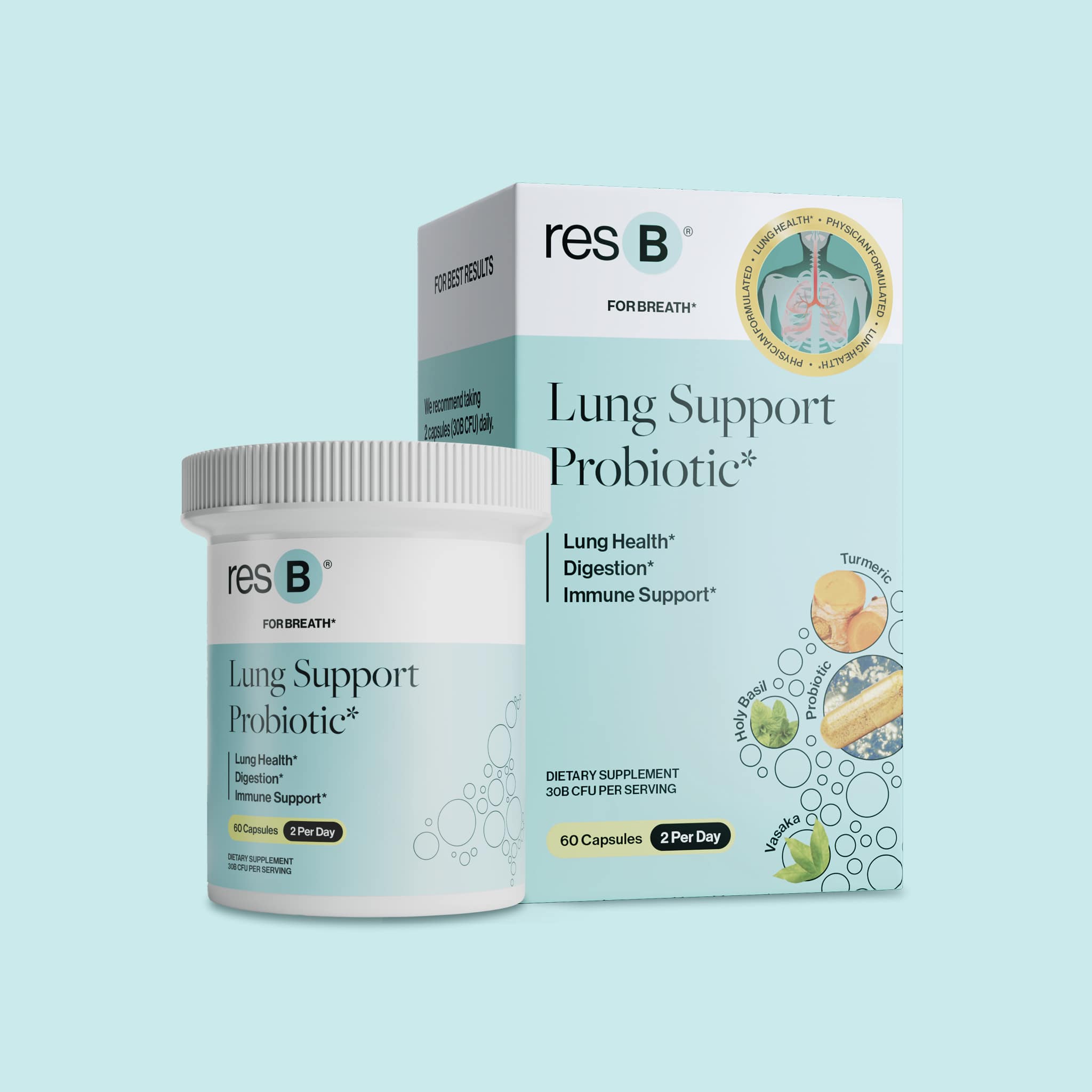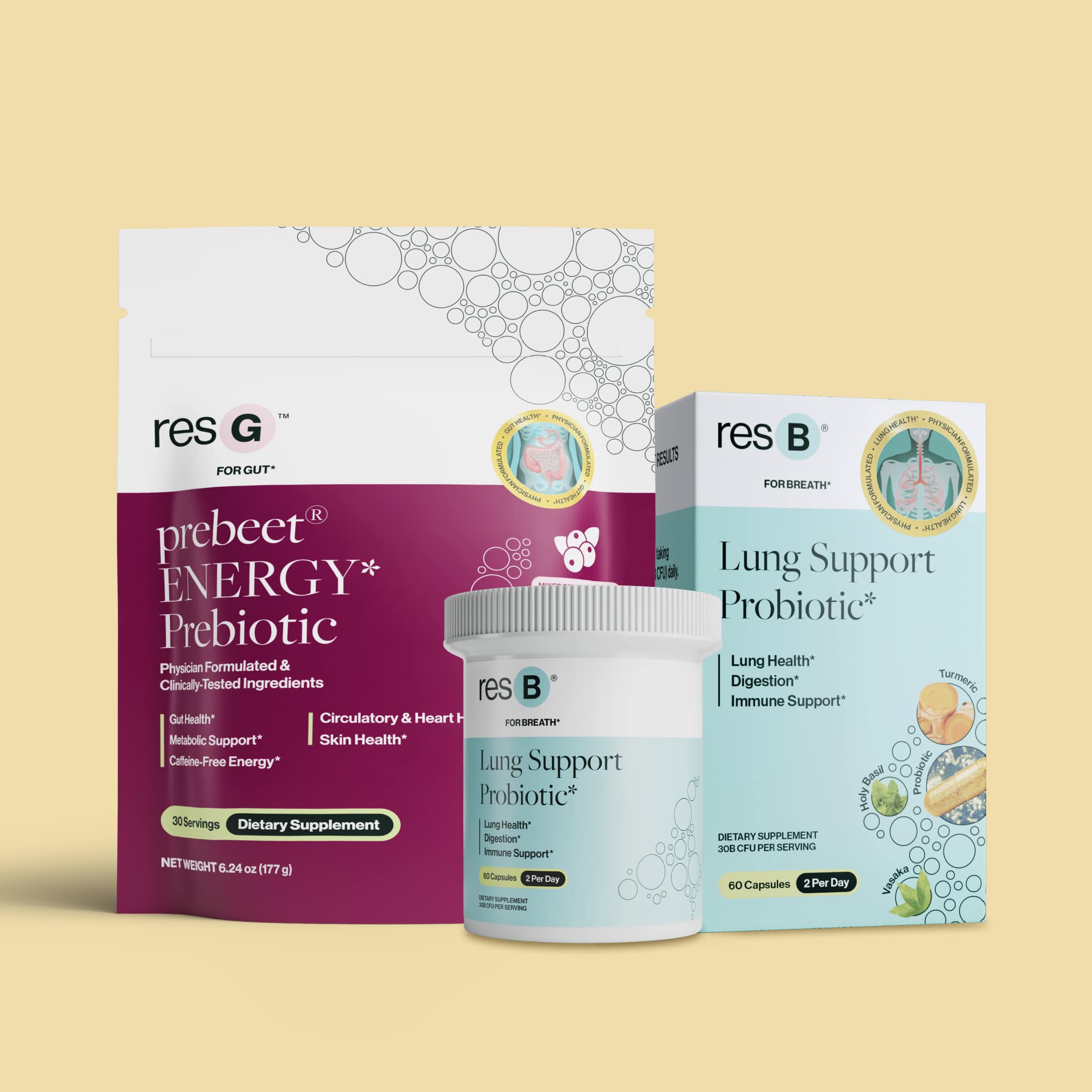Healthy lungs are responsible for more than just breathing - they're central to our overall health and vitality. But keeping our lungs clean and functioning optimally is a growing challenge due to increasing pollution and environmental toxins.
Fortunately, nature offers a treasure trove of remedies. We'll reveal the top 10 herbs for lung health, clearing mucus, and killing viruses, including turmeric, vasaka, and basil - which we believe to be the best herbs for lungs.
We’ll also highlight other lung health herbs like eucalyptus, mullein, peppermint, licorice root, ginseng, elderberry, and osha root. Beyond herbal solutions, you’ll discover other ways to support healthy lungs - like lifestyle changes, probiotics, and more.
What are the Top 10 Herbs for Lung Health, Clearing Mucus, and Killing Viruses?
So, what are the 10 herbs for lung health, clearing mucus, and killing viruses? While there are many natural herbal remedies that have been linked to lung health, these 10 herbs in particular have been studied in detail and found to support healthier lungs.
Turmeric
Turmeric is a potent balancing and antioxidant herb, thanks in large part to its active compound curcumin. Its effectiveness in lung health is due to curcumin's ability to modulate a healthy inflammatory process, which is a common underlying factor in various respiratory conditions.
Curcumin has been shown to inhibit the release of inflammatory mediators in the lungs, leading to reduced mucus production.
Furthermore, its antioxidant properties help protect lung tissue from the damage caused by free radicals and environmental pollutants. Turmeric also enhances the body's natural immune response, helping to fend off respiratory infections and viruses.
Incorporate turmeric into your diet by adding the powder to curries, smoothies, or teas. You can also consider a turmeric supplement with black pepper or piperine to enhance the absorption of curcumin.
Vasaka
Vasaka, also known as Malabar nut, contains the bronchodilator alkaloid vasicine, which has been traditionally used to treat respiratory disorders. Vasicine promotes the relaxation of bronchial muscles, leading to widened air passages and easier breathing.
The herb also has mucolytic properties, aiding in the breakdown and expulsion of mucus, thus clearing the airways. Vasaka's balancing and antimicrobial effects further contribute to its lung health benefits, making it a valuable herb for those with chronic respiratory conditions.
We have an entire guide highlighting the vasaka leaf benefits if you’d like to learn more.
Consume vasaka extract in tea, especially when dealing with productive coughs. Or, for more convenience consider supplements, which come in the form of capsules. We’ll share a unique supplement that harnesses the power of vasaka alongside other powerful herbs later on.
Basil
Basil, particularly Holy Basil or Tulsi, is revered for its therapeutic properties, including its effectiveness in respiratory system support. It contains compounds like eugenol and cineole that have expectorant properties, helping to clear mucus from the lungs.
Basil's balancing and antimicrobial attributes are beneficial in reducing lung imbalance and combating respiratory tract infections. It has also shown immunomodulatory effects, which can enhance the body's defense against viral infections, including those that affect the respiratory system.
Adding fresh basil leaves to meals helps you attain its benefits while also adding flavor to dishes. You could also consider drinking basil tea or using holy basil (Tulsi) supplements for additional respiratory support.


Eucalyptus
Eucalyptus is well-known for its menthol-like aroma, which comes from the compound eucalyptol. This compound acts as a natural decongestant, helping to break up mucus and clear the airways.
Eucalyptus also possesses antimicrobial properties, making it effective against bacteria that can cause respiratory illnesses. Its balancing action reduces swelling in the respiratory tract, which can alleviate symptoms of chronic lung health issues.
Inhaling eucalyptus vapor or using it in a diffuser can provide symptomatic relief for congestion and coughs. You can also consume eucalyptus in the form of tea as a part of your regular regimen to support healthier lung function.
Mullein
Mullein's leaves and flowers are traditionally used to treat respiratory conditions due to their soothing properties. This herb acts as an expectorant, helping to loosen and expel phlegm from the lungs, which is particularly beneficial for those with excessive mucus production.
Mullein also contains saponins, which reduce the thickness of mucus. This makes it easier to clear from the body. Meanwhile, its balancing compounds can alleviate irritated respiratory passages, providing relief from coughing and helping to improve breathing in chronic lung conditions.
Try brewing mullein leaves or flowers as a tea to soothe irritated respiratory tracts. If you’d like something easier and more convenient, you can find mullein extract or capsules at most health stores.
Peppermint
Just like eucalyptus, peppermint contains menthol - which you now know provides a cooling sensation and acts as a decongestant, helping to ease breathing. It relaxes the muscles of the respiratory tract, which can reduce symptoms of coughing and clear mucus from the lungs.
Peppermint also has strong antioxidant properties that can protect lung tissue from harmful free radicals. Its antimicrobial effects help in reducing the risk of respiratory infections, which is especially important for individuals with chronic lung conditions.
There are multiple ways to use this herb for its lung-supporting properties. Drink peppermint tea to relieve respiratory symptoms and clear mucus. Or, use concentrated peppermint oil through aromatherapy in a diffuser. You could also try diluting the oil and applying it topically to the chest to clear congestion.
Licorice Root
Licorice root has a long history of use in treating respiratory issues. It contains glycyrrhizin, which has been shown to have balancing and immune-boosting effects. Licorice root can soothe the mucous membranes in the lungs, reducing irritation.
Part of what makes this a unique herb for supporting lung health is that it enhances mucus production. While this may seem counterintuitive, the increased mucus is thinner and easier to clear from the lungs, helping to remove allergens and pathogens that are causing problems in the first place.
All that being said, it's important to note that licorice should be used with caution, as excessive consumption can lead to adverse effects. Follow supplement dosage guidelines carefully.
Ginseng
Ginseng offers a myriad of health benefits for respiratory health. It has been shown to improve lung function and reduce imbalance in the airways, while its immune-stimulating properties can help prevent respiratory infections.
Additionally, certain ginsenosides in ginseng have been found to have antiviral effects, which can be beneficial in protecting against respiratory viruses. For people with chronic lung health issues, ginseng may enhance respiratory endurance and reduce fatigue, improving their quality of life.
Consume ginseng in tea, as a supplement, or even as a chewable slice for respiratory and immune health. Just be sure to take the time to identify quality forms of ginseng, as they’re not all equal from a lung-health standpoint.
Elderberry
Elderberry has gained popularity for its potent antiviral properties, particularly against respiratory viruses. It’s rich in flavonoids like anthocyanins that support the immune system and have been shown to help reduce the severity and duration of cold and flu symptoms. These compounds also impart strong balancing effects that can alleviate respiratory conditions.
Elderberry's role in lung health is further supported by its ability to modulate cytokine production, which is crucial in the body's response to respiratory infections. You can take elderberry syrup or lozenges at the onset of respiratory symptoms or for immune support.
Osha Root
Last but not least on our list of the best lung health herbs, we have osha root. This root is native to the Rocky Mountain area and was traditionally used by indigenous populations for respiratory support. It’s clear to see why.
The root contains several compounds, including camphor, which promotes circulation to the lungs and aids in calming irritated respiratory mucous membranes.
Its bronchodilatory effect helps open up the airways, making breathing easier for those with chronic lung conditions. Osha root also possesses expectorant properties that help expel mucus and reduce congestion.
Use osha root in a tea or tincture form for acute respiratory support, particularly to aid in breathing during congestion. We recommend using it only for short-term relief and not as a preventative or daily supplement since it's so potent.
Other Ways to Support Healthy Lungs
While implementing a few of the best herbs for lung health is a great start, this is just one aspect of what should be a comprehensive regimen geared toward supporting healthy lung function. Here are some other ways you can start to breathe deeper and easier:
Lifestyle Changes for Improved Lung Function
Chances are, there are things you do (or don’t do…) that may be holding you back from peak lung health. Here are some lifestyle changes to consider:
- Avoid smoking or vaping if you have this habit. Your lungs are meant to filter air, and any sort of foreign smoke or vapor will continue to respiratory illness or dysfunction.
- Getting regular exercise is also important, as it strengthens the respiratory muscles, increases lung capacity, and improves overall circulation.
- A balanced diet rich in antioxidants from fruits and vegetables can protect lung tissue from oxidative stress.
- Adequate hydration is also essential, as it helps maintain the mucosal lining in the lungs, facilitating the clearance of mucus.
The Role of Probiotics in Lung Health
Emerging evidence suggests that a healthy gut microbiome can have a positive impact on lung health through the gut-lung axis. Probiotics, which are beneficial bacteria, can modulate immune responses and may reduce the severity of respiratory infections.
Probiotics may also influence lung health by improving the balance of the microbiome, which can be altered by antibiotics or infections.
Incorporating probiotic-rich foods like yogurt, kefir, and fermented vegetables, or taking a high-quality probiotic supplement, can support this aspect of respiratory health.


Environmental Factors and Lung Health
The quality of the air we breathe is intrinsically linked to lung health. Exposure to pollutants, such as vehicle emissions, industrial byproducts, and indoor allergens, can lead to chronic respiratory conditions and exacerbate existing lung issues.
Mitigating these risks involves using air purifiers to reduce indoor pollutants, avoiding outdoor activities when air quality is poor, and advocating for cleaner air policies. Minimizing exposure to secondhand smoke and occupational hazards like dust and chemical fumes is also critical for maintaining healthy lungs.
Conventional Treatments for Lung Issues
Pharmacologic therapies, such as bronchodilators and corticosteroids, are commonly prescribed to improve airflow.
Pulmonary rehabilitation programs are another solution. These offer a structured approach to exercise and education, helping patients with chronic lung diseases to improve their quality of life.
For severe conditions, surgical interventions or advanced treatments like oxygen therapy may be necessary.
All that being said, starting with the lung health herbs is a great first step that may eliminate the need for more intensive treatments like these.
Closing Thoughts on the Best Lung Health Herbs
That does it for our conversation on the best lung health herbs. From more mysterious herbs like Vasaka leaf to versatile, well-documented herbs such as turmeric, basil, and more - we’ve highlighted the top 10 herbs for lung health, clearing mucus, and killing viruses.
But remember - supporting lung health is a multifaceted endeavor that extends beyond just adding a few herbs into your dietary regimen. The synergy between ancient herbal wisdom and modern scientific research offers a promising avenue for enhancing respiratory function and overall well-being.
By embracing lifestyle changes, understanding the gut-lung connection, and being mindful of environmental factors, we can take proactive steps to protect and improve our lung health.
---
Whether you need a prebiotic or probiotic supplement or both we’ve got clinically studied solutions waiting to be discovered.
These are expert opinions on lifestyle from professionals who are board-certified physicians, registered dietitians, or healthcare professionals. This content does not represent any medical advice for the prevention or treatment of any medical diseases.